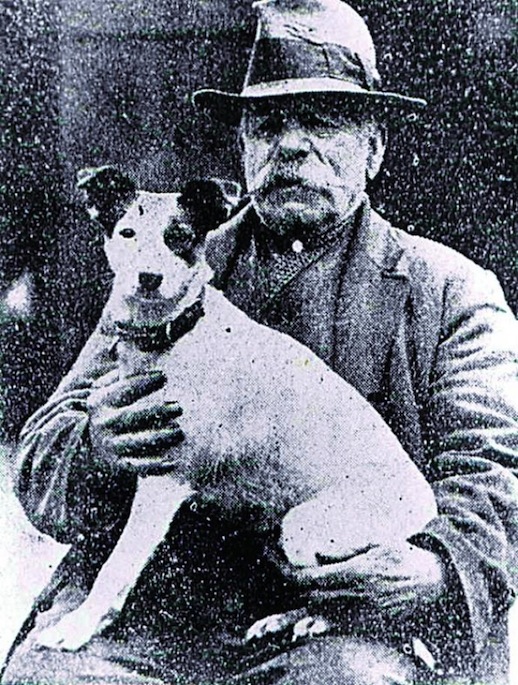 Photo of Frederick Rolfe, Bungay poacher, via Suffolk Magazine.
Photo of Frederick Rolfe, Bungay poacher, via Suffolk Magazine.
I Walked By Night by Lillias Rider Haggard and Frederick Rolfe (1935)
By Ben Myers.
My interest in reading about poaching in rural Britain can specifically be traced to one autumn day in 1983 when I first read Roald Dahl’s Danny The Champion Of The World and fell for the warm-hearted charms of a boy and his father who spend their nights illicitly creeping through woodlands to test out their latest ingenious methods for catching a few pheasants. In Dahl’s world, poaching is an anti-establishment act of defiance, a bit of harmless mischief that a single, caravan-dwelling father commits against, we presume, unseen wealthy landowners. It is a bloodless and romanticised take on poaching: the birds awake from a deep slumber to ultimately escape.
As an observer of nature and someone who generally believes in conservation, poaching as a pursuit, like fishing, presents a moral quandary. I am less concerned about the idea of stealing some fattened pheasants that have been fattened up for a shoot by a rich land owner’s gamekeepers than am I the idea of creatures being killed purely for sport. As a child I learnt to set rabbit snares in the Lake District, always secretly relieved to find them empty when I returned. I don’t like killing animals, but I do like reading about the old ways of rural life.
Historically the poacher is a warrior waging war on the class system. Perhaps this is why I am drawn to the tales of old poachers doing battle with gamekeepers in the gloaming and why I have slowly amassed a small library of books on the subject. Or maybe it is just because I am in love with those green cathedrals of the imagination, the English woodlands, that I never tire of reading about legendry poachers like Lincolnshire Romany Kenzie Thorpe or Black Bill, immortalised in Ian Niall’s The New Poacher’s Handbook, who “went after any bird: the bantams of Willie Adair, the fowls of the school mistress, the guinea birds of Mrs McQuade…”
Something of an under-rated classic in the genre, my latest find is I Walked By Night, the account of Norfolk poacher and mole-catcher Frederick Rolfe, whose notebooks were passed on to writer Lillias Rider Haggard to contextualise and edit into shape. First published in 1935 with the wonderfully self-aggrandising sub-title “Being the life and history of the King of the Norfolk Poachers”, it is a ragged and unadorned recollection of Rolfe’s years poaching career, which even in the 1930s seemed to tell of a world rapidly fading from view. Rolfe’s use of Norfolk vernacular and unique approach to spelling – “the Hedgehog is a very distructive animile” – adds an extra layer of colour to his narration. And though my experience of rural Norfolk is highly limited, it is nevertheless an England after dark that I recognise, being a place close in spirit and description to my nightly wanderings of the woodlands in the upper Calder Valley of West Yorkshire, where I live.
Like fishing, poaching is no longer done out of necessity by land workers and peasants to feed their families but is just an excuse to immerse yourself in nature – a reason to move down through to a deeper meditative level. At night the senses are alert and the poacher needs to think more like an animal. I Walked By Night – the title alone was enough to grab me – captures this. Of course, I’m romanticising again as poaching of old was so often defined by violent clashes, stints in front of the local magistrates and the death of animals, while there are still few things as abhorrent today as badger baiting and fox hunting. But Rolfe’s tales of cunning display a deep respect and understanding for animal life and his surroundings, and the notion that you only take what you need.
His is a book about the old ways, yet part of that world still just about exists. Because being out in the woods at night, in the pitch black darkness, not poaching but going where the poachers of old would go, and instead just stopping and listening and watching as owls take silent flight and foxes skulk and badgers scratch and snitter is, in some small way, like time travel. In these moments the modern world fades from view and all that remains is trees and mud and shifting shadows, primordial screeches and howls and caws, and the sensation of your heart beating in your chest.
The Caught by the River Nature Book Reader.
Ben Myers’ latest novella Snorri & Frosti is out now as a book or to download via Galley Beggar Press / 3AM Books